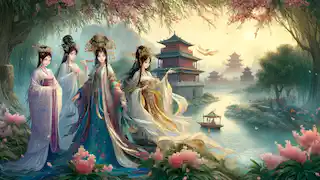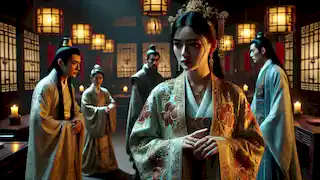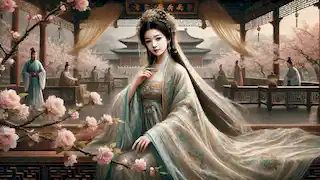The Legend of the Four Great Beauties
Reading Time: 8 min

About Story: The Legend of the Four Great Beauties is a Legend from china set in the Ancient. This Dramatic tale explores themes of Courage and is suitable for All Ages. It offers Cultural insights. The untold power of beauty and its influence on the fate of empires.
In the annals of Chinese history, few tales are as enduring as the legend of the Four Great Beauties. These women—Xi Shi, Wang Zhaojun, Diao Chan, and Yang Guifei—are celebrated not only for their unparalleled beauty but for the profound impact they had on the dynasties and empires of ancient China. Their stories intertwine love, sacrifice, and politics, showcasing how beauty can be both a blessing and a curse.
Each of the Four Great Beauties lived in a different era, and their lives were shaped by the unique challenges of their time. Yet, they share a common thread: their beauty and actions influenced the fates of kings and nations, altering the course of Chinese history. This expanded narrative delves deeply into their stories, revealing the complexities of their lives and the legacies they left behind. Xi Shi’s story begins during the tumultuous Spring and Autumn Period (770–476 BCE), a time when the Kingdom of Yue faced near-annihilation at the hands of the powerful Wu Kingdom. Born in a small village near the mountains, Xi Shi grew up among the simplicity of rural life, learning the art of silk weaving from her mother. Her beauty, however, was anything but ordinary. It is said that when she washed silk by the river, her reflection in the water was so breathtaking that fish would forget to swim and sink to the depths. This legend reached the ears of Fan Li, a brilliant strategist serving the Kingdom of Yue. Yue had suffered a devastating defeat to Wu, and its king, Goujian, sought revenge. Fan Li, knowing the influence of beauty on human affairs, proposed an audacious plan: to offer Xi Shi as a gift to King Fuchai of Wu, using her beauty to distract and weaken him. Xi Shi was taken to the Yue court and trained extensively in music, dance, and etiquette. Despite the gravity of her mission, Xi Shi accepted her role with quiet dignity, aware that her sacrifice could save her homeland. When she was finally presented to Fuchai, her beauty captivated him completely. He made her his favored consort, lavishing her with wealth and devotion. With Xi Shi by his side, Fuchai became increasingly indulgent, neglecting his kingdom's affairs and alienating his advisers. Meanwhile, Yue, under Goujian and Fan Li’s guidance, rebuilt its strength in secret. Xi Shi’s influence at the Wu court was pivotal in paving the way for Yue’s eventual victory. Yet Xi Shi’s story does not end with Wu’s downfall. Accounts of her fate diverge: some say she retired to live a peaceful life with Fan Li, who had fallen deeply in love with her during their time together. Others suggest she met a tragic end, thrown into the river by Goujian to erase any trace of her involvement. Regardless, her legend lives on as a testament to courage, sacrifice, and the price of beauty. During the Western Han Dynasty (206 BCE–9 CE), Wang Zhaojun’s story unfolded as an example of how beauty could bridge cultures and bring peace to warring peoples. Born in a small village in what is now Hubei Province, Wang Zhaojun was renowned for her intelligence, talent, and stunning beauty. Her parents, though modest, ensured she received a fine education, teaching her poetry, music, and calligraphy. Wang Zhaojun’s life changed when she was selected to join the imperial harem. The process of entering the harem, however, was rife with corruption. Palace painters, tasked with creating portraits of potential consorts, demanded bribes to ensure flattering depictions. Wang Zhaojun, refusing to pay, was painted in an unremarkable manner and relegated to obscurity in the emperor’s court. Years later, the Xiongnu, a nomadic people on the northern frontier, sought peace with the Han Empire. As part of the negotiations, the Xiongnu leader requested a Han princess as his bride. Unwilling to send a true princess, Emperor Yuan selected Wang Zhaojun, believing her to be insignificant. When she appeared before the court to bid farewell, her beauty stunned everyone, including the emperor, who immediately regretted his decision. Legend has it that as Wang Zhaojun journeyed north, her beauty astonished not only those who saw her but even nature itself. Geese flying overhead, mesmerized by her radiance, forgot to flap their wings and fell from the sky—hence her title, “The Beauty That Fell Geese.” Wang Zhaojun’s life among the Xiongnu was marked by both hardship and resilience. As the wife of the chanyu (leader), she bore children and worked tirelessly to foster peace between the Han and Xiongnu, easing tensions that had plagued the region for decades. Her sacrifice became a symbol of diplomacy and the enduring power of cultural exchange. Even in death, Wang Zhaojun’s legacy endured. Her tomb, known as the "Green Mound," remains a symbol of unity and respect between different peoples. Her story continues to inspire, illustrating the potential for beauty to transcend boundaries and bring harmony. The tale of Diao Chan is steeped in intrigue and political drama, set against the backdrop of the waning Eastern Han Dynasty and the rise of the Three Kingdoms. Though her historical existence is debated, her story has become a cornerstone of Chinese folklore and literature. Diao Chan was said to be a handmaiden to Wang Yun, a loyal and ambitious official. During this time, the tyrannical warlord Dong Zhuo controlled the imperial court, wielding power through fear and violence. His adopted son, Lü Bu, was a formidable warrior but lacked the political acumen to challenge Dong Zhuo directly. Seeing an opportunity, Wang Yun devised a daring plot to eliminate Dong Zhuo. He introduced Diao Chan to Lü Bu, who was immediately smitten by her beauty. Wang Yun then presented her to Dong Zhuo, who was equally captivated. Diao Chan, aware of her role in this dangerous game, skillfully played on the jealousy and rivalry between the two men. The tension between Dong Zhuo and Lü Bu escalated, culminating in Lü Bu assassinating Dong Zhuo in a dramatic confrontation. However, the power vacuum left by Dong Zhuo’s death plunged the region into further chaos. Diao Chan’s ultimate fate remains uncertain, with some stories claiming she lived in obscurity and others suggesting she was killed in the ensuing turmoil. Diao Chan’s story highlights the use of beauty as a weapon in the battle for justice and stability. Her courage and cunning remain celebrated in operas, novels, and dramas, making her an enduring figure in Chinese culture. The story of Yang Guifei, or Yang Yuhuan, is one of love, indulgence, and tragedy. Born in the Tang Dynasty (618–907 CE), Yang Guifei began her life as the wife of a prince. However, her extraordinary beauty caught the attention of Emperor Xuanzong, who brought her to his court and made her his favored consort. Yang Guifei’s charm and wit quickly elevated her to a position of immense influence. The emperor, besotted with her, neglected his duties, entrusting the governance of the empire to corrupt officials. Yang’s family, particularly her cousin Yang Guozhong, rose to power and amassed vast wealth, creating widespread resentment among the people. Despite this, Yang Guifei was deeply loved by the emperor. Her beauty was said to eclipse even the most vibrant flowers, earning her the poetic title, “The Beauty That Put Flowers to Shame.” She was a patron of the arts, and her presence brought a golden age of culture to the Tang court. However, the indulgence of the imperial court came at a cost. The An Lushan Rebellion, led by a disgruntled general, shook the empire to its core. As the rebellion spread, Emperor Xuanzong and his court fled the capital. Along the way, the army mutinied, blaming Yang Guifei and her family for the empire’s suffering. Under immense pressure, Xuanzong was forced to order Yang Guifei’s execution to appease his troops. Her death marked the end of an era and left an indelible mark on Chinese history. Yang Guifei’s story is immortalized in countless poems, paintings, and plays, symbolizing the fleeting nature of beauty and the tragedy of lost love. The Four Great Beauties are more than historical figures or legends; they are cultural icons whose stories reflect the complexities of power, love, and sacrifice. Their lives, though vastly different, share a common theme: the ability of beauty to shape the destiny of nations. Through their tales, Xi Shi, Wang Zhaojun, Diao Chan, and Yang Guifei continue to inspire and caution us. They remind us of the delicate balance between grace and influence, as well as the personal costs borne by those who wield great power. Their legacies endure in art, literature, and the collective memory of a civilization that cherishes the interplay of beauty and history.Xi Shi: The Beauty That Drowned Fish

Wang Zhaojun: The Beauty That Fell Geese

Diao Chan: The Beauty That Obscured the Moon

Yang Guifei: The Beauty That Put Flowers to Shame

The Enduring Legacy of the Four Great Beauties

















